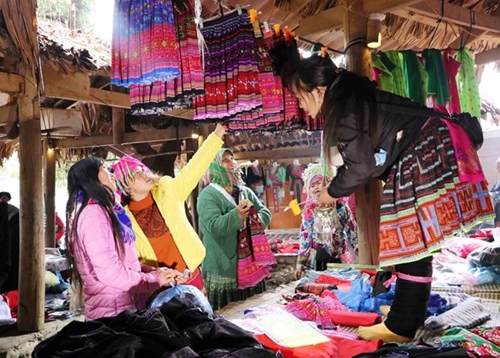So said UNFPA Representative in Vietnam Naomi Kitahara in an interview with the Vietnam News Agency during a trip to the northern mountainous province of Lai Chau from May 4 to 7.
Officials from the UNFPA, the Ministry of Health, and the Ministry of Planning and Investment surveyed maternal health care in some disadvantaged ethnic minority areas of Lai Chau.
    |
 |
|
Photo for illustration: dantocmiennui |
Pointing out two big challenges to maternal health care in ethnic minority areas of Vietnam, Kitahara noted that ethnic minority people mostly reside in remote areas, which hampers their access to reproductive and sexual health services, while their ethnic groups’ special cultural and social conditions also make it difficult to provide guidance on and apply reproductive and sexual health care measures.
She underlined the need to increase communications and guidance in ethnic minority languages, adding that medical workers and midwives should also speak local languages to give explanation.
The UNFPA always exerts efforts to ensure that there won’t be more maternal deaths, all demand for family planning is met, and gender-based violence and harmful practices are prevented.
It has been working closely with the Ministry of Health, the Ministry of Planning and Investment, and other ministries and sectors to identify the most effective strategies to assist Vietnam, with a focus on vulnerable groups like ethnic minority people, migrants, the youth, and the disabled, the UNFPA Representative said.
In efforts to support ethnic minority people, some of the main strategies suggested by the UNFPA include improving health workers’ capacity so that they are capable of dealing with different obstetric problems and diseases, and capitalising on online communications platforms and tele-guidance systems to overcome difficulties caused by special cultural and social conditions, the language barrier, and geographical distance, according to Kitahara.
Highlighting the importance of village-based midwives and communications to improve public awareness and behavior, she also noted that the COVID-19 pandemic is causing major challenges when expectant mothers tend to delay or skip pregnancy tests, posing high risks during their pregnancy.
She stressed the necessity to create a safe environment for expectant mothers so that they can feel safe when visiting healthcare establishments, and to provide protective equipment for medical workers to safely perform their duties.
By combining those strategies, the UNFPA is confident of helping reduce the maternal mortality, its representative added.
Source: VNA